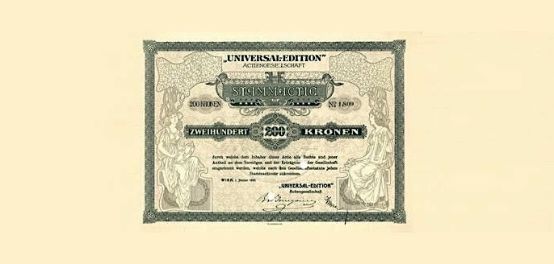Illustrious publishing history
Universal Edition in Vienna had a decisive influence on the history of the reception of modern music, especially in the interwar period. Hans W. Heinsheimer's chronicle describes this phase from the perspective of the back room.

Whoever remembers the Menagerie in F sharp major by Hans W. Heinsheimer (published in Zurich in the 1950s) and to whom the abbreviation UE means more than just two letters of the alphabet, will approach this chronicle of the Viennese music publisher Universal Edition with pleasure and curiosity. In the first thirty-seven and a half years, of which Heinsheimer spent fifteen years as head of the UE stage department, an astonishing amount of what today embodies the first half of the 20th century musically was published there: Works by Gustav Mahler, Arnold Schönberg, Alban Berg, Paul Hindemith, Kurt Weill, Ernst Krenek, Béla Bartók, Leoš Janáček and others - successful works such as the Wozzeck, Jonny spielt auf, The Threepenny Opera or Jenůfa.
The history of the reception of modernism, especially in the interwar period, is fanned out in this publishing history. It shows that this focus unexpectedly fell to the Viennese publishing house as a result of political developments in Germany. In close connection with the publishing house Music sheets of the Anbruch published unconventional, progressive and provocative essays, concert reviews and reviews of works that were able to set new trends. Heinsheimer already accepted the first texts by the 23-year-old Theodor Wiesengrund-Adorno, but also Ernst Krenek's comment that these essays "went beyond the style of his speech (he spoke as if in print) into that region of hermetic encryption that borders on mannerism and makes reading his work as appealing as it is difficult". Heinsheimer portrayed the publishing clients who came and went with him accurately and with sometimes smugly affectionate attention, was able to show understanding for Bartók's fussy approach to printing music and could recount Karl Kraus' opinionated attitude towards the contract for his Offenbach adaptations down to the last detail with relish.
It is a pleasure to see the history of music recorded by him from the perspective of the back room; it makes you realize anew what a decisive role the UE played for the works of the Viennese School and for contemporary music, with the large number of world premieres reported in the Commencement (1919-1937) and in Lectern and baton (1924-1930), but only until the right-wing agitation against "degenerate art" also dominated in Vienna and the publications had to be discontinued. All volumes of both journals are now fully digitally accessible.
However, it should also be mentioned that this chronicle was written in 1975, but was not completed and therefore not printed. Forty years later, it is still worth reading - Heinsheimer died in New York in 1993 at the age of 93.
Hans W. Heinsheimer: UE - The first 37 ½ years. A chronicle of the publishing house, 160 p., ill., € 19.95, Universal Edition, Vienna 2017, ISBN 978-3-7024-7513-0








